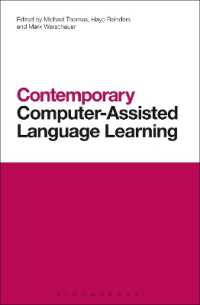Full Description
Writing power radically rethinks the place of the canon and canonicity as objects and concepts in contemporary academia and the everyday intellectual practices of academics. It is distinctive in its demonstration of how academics' engagements with canons shape their writing practices but also how scholars' writing practices, spaces, proclivities, and desires shape the canon and changing ideas of value in canonicity. The book thinks through frequently discussed problems of legitimacy and knowledge production from fresh perspectives of lived experience and the everyday to offer new insights into the politics of knowledge in contemporary social sciences.
Contents
Introduction: What's writing got to do with it? How academics make knowledge and why it matters
1 The origin story of the British sociological canon: here, there, and now
2 'The kind of thing you see on Morse': intellectuals, aesthetics, and academic writing in popular culture
3 Legitimacy, value, and the craft of writing: how do scholars write?
4 Affective relations and the 'ideal other': cultural capital, cosmopolitanism, and writing
5 Materiality and mood: finding legitimation in our spaces of writing
6 Becoming and belonging: writing as a process of legitimation
7 Geographies of knowledge: across space and place in sociology
8 How do you solve a problem like the mainstream?
Conclusion: Reflections on sociological knowledge: power, performances, and futures
Appendix A: Participants
Appendix B: Research Excellence Framework
Bibliography
Index






